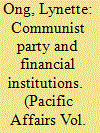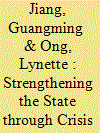| Srl | Item |
| 1 |
ID:
090969


|
|
|
|
|
| Publication |
2009.
|
| Summary/Abstract |
Although the rural credit cooperatives are the only formal credit providers to millions of households in rural China, empirical evidence suggests that they do not serve the interests of member households very effectively. This study examines how far the recent institutional reforms have addressed the problems of insider control and collective action in corporate governance and reduced local political influence on their operations.
It contributes to the currently scant literature on the reasons for the persistence in China of local political interference in loan allocations. This study's findings suggest the need for a re-evaluation of the conventional wisdom that the role of local states in China's development is a positive one.
|
|
|
|
|
|
|
|
|
|
|
|
|
|
|
|
| 2 |
ID:
071586


|
|
|
|
|
| Publication |
2006.
|
| Summary/Abstract |
Ample empirical evidence suggests that Rural Credit Cooperatives (RCCs), which are the core financial institutions in rural China, are not accountable to their member households. This article argues that this conundrum can be explained by an institutional analysis of the credit cooperatives using the multiple principals-agent framework: the credit cooperatives as agents are accountable to multiple heterogeneous principals¾with multiple conflicting objectives. The multiple principals are (1) the County RCC Unions, which exercise control using the evaluation criteria on which the remuneration of grassroots RCC officers is assessed; (2) local party secretaries, who exert influence through top personnel appointment and dismissal in the credit cooperatives; and (3) member households, which are a "collective" principle. In a multiple-principals scenario, the "collective" principal has weaker control over the agents due to the "collective action" problem.
|
|
|
|
|
|
|
|
|
|
|
|
|
|
|
|
| 3 |
ID:
072718


|
|
|
|
|
| Publication |
2006.
|
| Summary/Abstract |
This article sheds light on the ways in which township governments mobilized resources from local financial institutions, and how failure to repay many of these loans gave rise to sizeable local government debt. Mobilization of resources was done through loans to collective enterprises whose de facto owners were township authorities. Though the enterprises were nominal borrowers, loan transactions would not have occurred without guarantees by township governments. Another way of financial resource mobilization was by establishing local informal financial organizations that were subject to less strict regulations, and over which township authorities could exercise control. Further, because the enterprises' profits and taxes ultimately went to township authorities, and the enterprises also contributed towards provision of public goods that were the authorities' obligation, enterprise financing became a roundabout way in which township authorities sought financial assistance for their fiscal needs.
|
|
|
|
|
|
|
|
|
|
|
|
|
|
|
|
| 4 |
ID:
187448


|
|
|
|
|
| Summary/Abstract |
How do state leaders use crisis management to strengthen state infrastructural power? What explains the strategic choices of a state’s selective institutionalization of crisis measures? Crises offer unique opportunities for state-building, yet the role of crisis management in consolidating state power is underexamined. This paper explores these important issues by examining how the Chinese government has deployed wartime-like measures in battling the spread of Severe Acute Respiratory Syndrome (SARS) and COVID-19. While authorities in China have adopted unconventional measures in managing the crises, they have selectively normalized ad hoc practices and institutionalized certain measures to strengthen state infrastructural power once they have ended or been temporarily contained. Drawing on the frameworks of rational choice and historical institutionalism, our analysis suggests that the central government normalizes or institutionalizes measures that help to consolidate its control of the bureaucracy and enhance regime legitimacy.
|
|
|
|
|
|
|
|
|
|
|
|
|
|
|
|